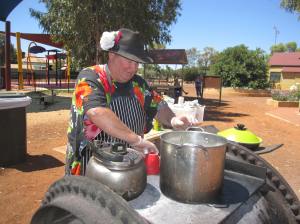As much as I’d love you, my dear reader, to be at church on Sunday morning, I know it’s not always possible. If that’s the case I would encourage you to listen to JD on Sonshine fm, and guess what? You may hear me. I’ve recorded six three-minute messages that will be played on Sonshine fm on Sunday mornings. Here’s one of them:
Wedge Tailed Eagles feeding off the carcasses of kangaroos were the main feature of a trip I had some time ago between Leinster and Mt Magnet in the Mid West region of WA. So it proved to be a welcome change when we came across the tiny township of Sandstone. There was a mass of white roses along the wide main street and this contrasted with the red dirt and immediately announced that there was something different about this place.
For a period of six years from 1907 Sandstone had a population of 6,000 to 8,000 people. It had four hotels, four butchers, many cafes, stores and business houses, as well as a staffed police station and two banks. During this boom period, in July 1910 the railway came to the town, however by 1919 only 200 people remained. The population has continued to dwindle.
As we drove slowly through the deserted streets we spotted someone waving to us and heard a voice call out, “come and have a cup of tea”. It turned out that Lady Di, as she is affectionately known, has lived in Sandstone for 12 years and three days a week runs a sausage sizzle in the park, cooking up her own recipe of herbs and spices to provide a hearty welcome for the visitors who pass by on a regular basis.
So a cup of coffee and a chat with Lady Di was a welcome relief from the long, hot drive and gave us a picture of a community that was struggling to survive, but was welcoming of strangers, and keen to make its contribution to the wider community of travellers.
Communities that look after their own, are wonderful, but communities that welcome strangers and contribute to the lives of those outside have an element that is unforgettable.
There’s been plenty of criticism of the church over the years, and some of that criticism is warranted. But from the first century when the church first came into being, the idea of welcoming strangers was always at its heart. The church was not intended to just be another country club, or a secret society where only those who could recognise the password could enter.
Jesus ate with the people who nobody else wanted to mix with. He identified with those who were outcasts, the people with disabilities, the people whose behaviours made them unacceptable in a “good” society.
Every community needs a Lady Di who is prepared to put up with the heat and flies to offer a welcome to outsiders, but I think all of us need to have that sort of commitment to reach out beyond ourselves to welcome strangers.
If you’re not a part of a local church I’d encourage you to find one that welcomes strangers, a church that offers you the opportunity to grow to be more like Jesus yourself. A community where you can receive the support and help you need for your own spiritual and emotional growth, but where you can become a person who reaches out to others with the love of Jesus.

